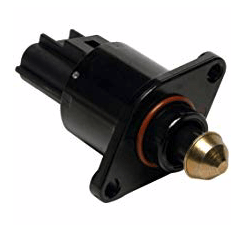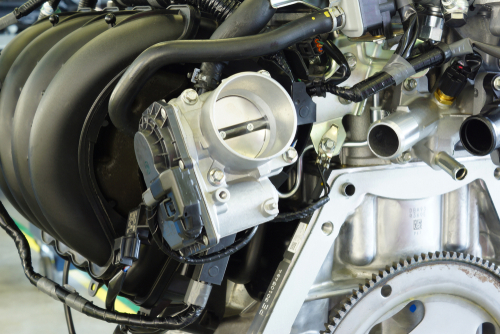
P0507 is a fairly typical OBDII trouble code that can occur in the Ford Kuga. It is typically triggered when the engine idle speed is 200 rpm or more over the predetermined limit set by the Ford
It is a generic code, which means that it has the same meaning for the Ford Kuga as any other vehicle.
P0507 Code Definition
Idle Air Control Valve

The P0507 code is related to your Ford Kuga’s idle air control system. The idle air control valve (IAC) plays a crucial role in maintaining a smooth idle by regulating the amount of air entering the engine.
It’s essential to maintain your Kuga’s idle air control system to optimize engine performance and fuel efficiency.
RPM Higher Than Expected
When the P0507 code appears, it means that the engine’s RPM is higher than Ford’s specifications (at idle when you aren’t pressing your Kuga’s accelerator pedal). This can lead to poor fuel economy, increased emissions, and reduced engine performance.
P0507 Symptoms

Unlike many OBDII trouble codes, P0507 will typically be noticeable to you when driving. Here are the typical symptoms of this code in :
- Service Engine Soon Light– The reason why you are here. If there’s also a vacuum-related trouble code, start there.
- Faster Idle Speed– Assuming that the code has been thrown due to a legitimate issue, you should notice the engine running faster when not pushing the gas.
- Thud Going Into Drive– Transmissions really don’t like to shift from park to drive at an RPM higher than idle. It is common to feel the whole vehicle jerk when put into gear with P0507.
- Vehicle Takes off Faster– With the engine idling higher, people report feeling their Kuga take off when releasing the brake pedal. This can make driving more dangerous.
Causes of P0507 Code

There could be several reasons behind the P0507 code being triggered in your Ford Kuga. Understanding these causes can help you identify and fix the problem. Here are some common causes:
- Intake air leak: An air leak in the intake system can disrupt the air-fuel ratio and cause the engine to idle higher than expected. Check for any cracks, damage, or loose connections in the hoses, gaskets, and other components of the intake system.
- Poor electrical connection to the Intake Air Control (IAC) valve: A faulty connection or wiring between the IAC valve and the engine control module (ECM) can cause the engine to idle higher than expected. Inspect the wiring and connectors for damage or corrosion and ensure they are securely connected.
- Malfunctioning IAC valve: The IAC valve is responsible for maintaining proper engine idle speed. If it is not functioning correctly, it could cause the P0507 code to trigger. Check the valve for damage and proper operation.
- Faulty throttle body: The throttle body controls the engine’s air intake. If it is not functioning correctly or is dirty, it could cause the engine to idle higher than expected. Inspect the throttle body for proper operation, cleanliness, and damage.
Remember to keep safety in mind when working on your vehicle. Always use the appropriate tools and techniques and consult your owner’s manual or a professional mechanic if you are in doubt about something.
P0507 Code Diagnosis and Repair

There are a lot of potential causes of P0507. While the code specifically mentions the “Idle Air Control System”, it would be a mistake to just go ahead and replace it without a little due diligence. The Idle Air Control Valve is often not the cause of the code.
Here are some of the most common causes of P0507 in the Ford Kuga, as well as waist to troubleshoot them. Keep in mind that there are differences in model years. It would be a good idea to start by looking for a vacuum leak and move forward from there.
1. Inspect for vacuum leaks:
A common cause of the P0507 code is a vacuum leak within the engine. Check all vacuum hoses and connections for any signs of damage or loose fittings. Replace or repair any components if necessary.
How to Find a Vaccum Leak in a Vehicle (Popular Mechanics, Article)
How to Find a Vacuum Leak in about a Minute (2CarPros, YouTube)
2. Examine the Idle Air Control (IAC) valve:
If no vacuum leaks are found, the next step is to inspect the IAC valve. This valve is responsible for controlling the engine’s idle speed. Refer to your vehicle’s service manual to locate and inspect the IAC valve for any signs of damage or malfunction. Clean or replace the valve if needed.
3. Check the throttle body:
The throttle body can also be the cause of a P0507 code. Inspect the throttle body for any signs of damage or buildup of dirt and debris. Clean or replace the throttle body if necessary.
Signs Your Throttle Body Is Going Bad, and What to Do (Repair Pal)
How to Tell if Your Throttle Body is Dirty or Bad (YouTube Auto Repair, Youtube)
4. Test for faulty sensors:
Some vehicles may have idle speed issues caused by faulty sensors, such as the Mass Air Flow (MAF) sensor or the Throttle Position (TP) sensor. Check these sensors and their wiring for any signs of damage or malfunction. Replace or repair any components as needed.
5. Verify the repair:
After addressing any potential issues, clear the P0507 code using an OBD-II scanner and then start your Ford Kuga. Allow the engine to idle for a few minutes and confirm if the idle speed is within the specified range. If the issue persists, you may need to seek the help of a professional mechanic for further diagnosis and repair.
Remember to consult your Tacmoma’s service manual for specific diagnostic, repair, and tool information tailored to your particular model. Always use caution and proper safety measures when working on your vehicle.
Safety Measures
When working on your Ford Kuga, it’s crucial to follow safety procedures to protect yourself and your vehicle:
- Disconnect the battery: Before performing any repair or diagnosis, ensure the engine is off, and disconnect the negative battery terminal to prevent electrical accidents.
- Use OBD-II scanner: Utilize an OBD-II scanner to read and clear any trouble codes, making sure you understand the issue before proceeding.
- Wear proper safety equipment: Always use gloves, safety goggles, and appropriate clothing while working on your vehicle.
- Follow proper lifting guidelines: If you need to lift your Kuga, use a jack and jack stands designed for your vehicle’s weight and ensure you’re on a flat, stable surface.
Remember to take your time and follow these technical and safety measures to effectively troubleshoot and resolve the P0507 code in your Ford Kuga.
Conclusion
P0507 is a serious issue. Due to the unsafe nature of driving with an engine that is revving higher than it’s supposed to, we recommend having your Kuga serviced as soon as possible. Good luck!
Frequently Asked Questions
What causes code P0507 in a Ford Kuga?
P0507 code in a Ford Kuga is caused by the engine’s idle speed exceeding the manufacturer’s specifications over a certain period of time. This code is part of a series of faults (P0505-P0509) related to the idle control system. Possible reasons include:
- Faulty or dirty idle air control valve
- Vacuum leaks
- Throttle body issues
- Malfunctioning sensors, such as the throttle position sensor or mass airflow sensor
Can cleaning the throttle body trigger P0507 in a Ford Kuga?
Yes, cleaning the throttle body can sometimes trigger P0507 in a Ford Kuga if the cleaning process disturbs deposits or dirt within the throttle body. This can cause an increase in the engine’s idle speed. However, proper cleaning of the throttle body is essential for optimal performance and may resolve the issue if it was caused by buildup or debris in the first place.
How do I fix code P0507 in a Ford Kuga?
To fix code P0507 in a Ford Kuga, you should take the following steps:
- Verify the code using an OBD-II scanner and make a note of any additional fault codes that may be related.
- Inspect the idle air control valve for dirt, debris, or any other signs of malfunction.
- Check for vacuum leaks by visually inspecting hoses and connections, and using a device such as a vacuum gauge or smoke machine.
- Inspect and clean the throttle body as needed.
- Assess the throttle position sensor and mass airflow sensor for proper operation, replacing them if necessary.
- If the issue persists, consider seeking professional help from a mechanic.
Is it safe to drive a Ford Kuga with a P0507 code?
While it may be possible to drive your Ford Kuga with a P0507 code, it is not recommended. An increased idle speed can lead to poor fuel efficiency, increased emissions, and potential damage to the engine or other components. It’s best to address the issue as soon as possible to avoid costly repairs or further damage.
Can a vacuum leak cause P0507 in a Ford Kuga?
Yes, a vacuum leak can cause P0507 in a Ford Kuga. Vacuum leaks can lead to an increase in the engine’s idle speed, as the engine’s computer tries to compensate for the extra air entering the system. This can result in the P0507 code being triggered. It’s important to inspect and repair any vacuum leaks in your vehicle to resolve this issue and prevent additional problems.

